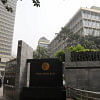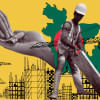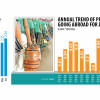Remittances climb, buoyed by higher exchange rate

The inflow of remittance to Bangladesh increased 21 percent year-on-year to $1.93 billion in November as most banks are offering higher rates for the US dollar to boost foreign currency collection.
However, November's receipts were actually down 2.42 percent from the $1.98 billion registered in October, data from the Bangladesh Bank showed.
Some banks are offering up to Tk 5-6 more than the permitted rate for buying greenbacks from remitters. The rate was set at Tk 109.75 in November and it does not include the incentives.
The Bangladesh Foreign Exchange Dealers Association (Bafeda) and the Association of Bankers Bangladesh (ABB) have been revising the buying and selling rates for the USD since last year as per an unofficial direction from the central bank.
Banks and the government are both paying a 2.5 percent incentive from their own funds for transferring remittances through official channels. As such, the beneficiaries are officially entitled to Tk 114.75 per USD.
"Remittance inflow decreased in the last few months. So, we assume more money came in October and November as banks started offering an additional incentive," said Emranul Huq, managing director and CEO of Dhaka Bank.
Besides, the Bafeda and the ABB recently cut the USD rate in a bid to push expatriates into sending home money they previously held on to in hopes of a further rise in value.
Huq also said banks have upped their efforts to collect remittances amid the ongoing forex crisis.
Echoing the same, Syed Mahbubur Rahman, managing director of Mutual Trust Bank, said the remittance inflow rose in the last week of November thanks to the initiative of banks.
However, a chief executive of a private commercial bank, seeking anonymity, said banks are not able to buy the USD for less than Tk 120-121 per greenback from exchange houses despite having to sell it for Tk 114.75.
Islami Bank Bangladesh Ltd saw the highest growth in remittance earnings last month as it received $472.22 million.
Pubali Bank came second with remittance earnings of $139.24 million while NCC Bank brought home $85.25 million and Social Islami Bank $91.46 million.
State banks are lagging behind private ones in terms of remittance collection, as per central bank data.
Md Abdul Jabbar, managing director and CEO of Janata Bank, recently said that Bangladeshi expatriates are sending remittances only through the banks that offer higher rates of the US dollar.
"But we are unable to do so as we must comply with the Bafeda-ABB rates."
Experts say the remittance inflow has not received as much of a fillip as expected because of the growing use of the hundi system, an illegal cross-border transaction service.
Ahsan H Mansur, executive director of the Policy Research Institute of Bangladesh, said there can be some variation month-to-month, but the remittance inflow is not increasing in pace with the country's growing number of migrant workers.
More than 11.35 lakh Bangladeshis left the country for jobs last year, nearly double the 6.17 lakh migrant workers who flew off the previous year.
The economist said the government is taking balance of payments support from the International Monetary Fund, the Asian Development Bank and the World Bank to tackle the forex crisis.
"However, it will have to correct the related policies in order to ease the situation."
Mansur suggested implementing a unified exchange rate and raising the policy rate to tackle the ongoing inflationary pressure and forex crisis.
The country's reserve stood at $19.40 billion on Wednesday following a constant decline since August 2021 due to the higher outflow of foreign exchange compared to inflow. The reserve is calculated on the basis of a formula of the IMF.
The reserve crossed $48 billion in August 2021, a record high.

 For all latest news, follow The Daily Star's Google News channel.
For all latest news, follow The Daily Star's Google News channel. 







Comments